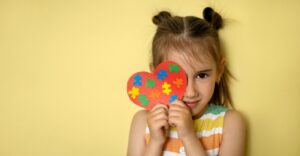Sponsored by Our Lady of the Lake Children’s Health
Autism is not an intellectual disability. All of our brains are wired differently and handle information differently. With 1 in 53 American children being diagnosed with autism each year, we need to do a better job of understanding and explaining autism in a positive, non-threatening way so children can be accepted despite their differences. But how can you explain autism to neurotypical kids so they can connect with their autistic peers?
Board Certified in developmental behavioral pediatrics, Our Lady of the Lake Children’s Health’s Dr. Steven D. Felix specializes in the diagnosis, treatment, and management of children with developmental and behavioral conditions, including Autism, Intellectual Disability, Cerebral Palsy, Developmental Delays, Speech Disorders, and complicated ADHD. Dr. Felix shares a few ways to bridge the gap between children and their friends on the spectrum.
First, help them understand the basics.
“Neurotypical” describes someone who thinks and processes information in ways that are typical within their culture. They tend to learn skills and reach developmental milestones around the same time as their peers. In contrast, the term “neurodivergent” describes someone who processes information in a different way. Autistic people and those with attention deficit hyperactivity disorder (ADHD) and similar conditions sometimes identify as neurodivergent.
Children with autism experience communication challenges, an inability to express emotions and understand those of others, sensory sensitives, difficulty with transitions, poor impulse control, and problems with self-regulation. Parenting a child with autism is not easy. We can all be more supportive—remove the stigma around autism—and show the world what children on the spectrum are capable of achieving.
Be an active ally.
Autism can be extremely confusing and isolating for a child. When speaking with an autistic child, focus on the positives, on what the child does brilliantly. A few other ways to encourage children to be active allies are:
• Find something they have in common with the other kids to help them connect.
• Invite their autistic friend to join extracurricular activities with like-minded kids.
• Ask what games they enjoy or topics they like to discuss.
One of the biggest struggles in understanding autism is making sense of sensory meltdowns. Everyday experiences can feel overwhelming to someone on the autism spectrum. It’s difficult to comprehend how confusing a sensory meltdown feels to a child. Sensory meltdowns can often look like a massive tantrum. This confuses many adults. Some stare and others even make rude comments. The easiest way to describe a sensory meltdown is that it is feeling overwhelmed. That when our friends are having a sensory meltdown it is because there is too much happening around them.
Honest questions are not rude.
A neurotypical child will ask all sorts of questions, some of which can hit a sore spot. Be prepared to answer them in a way that does not shame them for asking. Keep your explanations developmentally appropriate, leaving out the parts that you know a child will not developmentally comprehend.
Support exists.
One of the few interdisciplinary clinics in Louisiana with a developmental pediatrician, therapists and neuropsychology in one place, Our Lady of the Lake Children’s Health delivers individualized treatment for every child. The aim is to first identify the child’s strengths and challenges in the home, community, and school settings, and secondly, provide relevant recommendations.
Our Lady of the Lake Children’s Health Developmental Medicine offers an interdisciplinary approach to medicine, therapy, and treatment to encourage healthy development and behavior in children. Serving children birth to 18 with mild to moderate to severe disabilities or developmental delays, Dr. Felix and his team, including speech, occupational and physical therapy, help kids be as independent as they can be. Cognitive testing with our neuropsychologist as well as behavior therapy with our social worker is also available.
Visit ololchildrens.org to learn more about Developmental Medicine.







